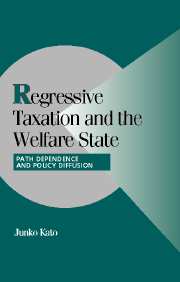Book contents
- Frontmatter
- Contents
- Preface
- Regressive Taxation and the Welfare State
- 1 ARGUMENT: PATH DEPENDENCY AND THE DIFFUSION OF A REGRESSIVE TAX
- 2 EUROPEAN VARIATION: SWEDEN, THE UNITED KINGDOM, AND FRANCE
- 3 CONTRASTING PAIRED COMPARISONS IN OCEANIA AND NORTH AMERICA
- 4 ANOTHER PATTERN OF PATH DEPENDENCE: A COMPARISON BETWEEN JAPAN AND THE NEWLY DEVELOPING ECONOMIES
- 5 THE POLITICAL FOUNDATION OF FINANCING THE WELFARE STATE: A COMPARATIVE VIEW
- Appendix: List of Variables Used for Statistical Analyses
- Bibliography
- Index
- Cambridge Studies in Comparative Politics
4 - ANOTHER PATTERN OF PATH DEPENDENCE: A COMPARISON BETWEEN JAPAN AND THE NEWLY DEVELOPING ECONOMIES
Published online by Cambridge University Press: 24 July 2009
- Frontmatter
- Contents
- Preface
- Regressive Taxation and the Welfare State
- 1 ARGUMENT: PATH DEPENDENCY AND THE DIFFUSION OF A REGRESSIVE TAX
- 2 EUROPEAN VARIATION: SWEDEN, THE UNITED KINGDOM, AND FRANCE
- 3 CONTRASTING PAIRED COMPARISONS IN OCEANIA AND NORTH AMERICA
- 4 ANOTHER PATTERN OF PATH DEPENDENCE: A COMPARISON BETWEEN JAPAN AND THE NEWLY DEVELOPING ECONOMIES
- 5 THE POLITICAL FOUNDATION OF FINANCING THE WELFARE STATE: A COMPARATIVE VIEW
- Appendix: List of Variables Used for Statistical Analyses
- Bibliography
- Index
- Cambridge Studies in Comparative Politics
Summary
The cases of the seven industrial democracies discussed in Chapters 2 and 3 demonstrate that the development of a tax state and a welfare state is path-dependent upon the development of the state's funding capacity. The focus is on a revenue reliance shift from income to consumption before the government's experience of chronic budget deficits. In newly developing countries, however, the pattern of path dependence of the tax revenue structure is different from the one in the industrial democracies, because it has been common knowledge which tax is effective to raise revenue and how to administer it. A comparison between Japan and newly industrializing Taiwan and South Korea in this chapter will explicate how a different pattern of path dependence explains the different development of the funding capacity of the welfare state.
The Diffusion of the Value Added Tax into Newly Developing Economies
Mobilizing financial resources and raising tax revenue are important tasks for newly democratizing and industrializing countries. The failure to finance the public sector results in deficit finance and excessive money printing. Both are undesirable for developing economies, which often suffer from balance-of-payment problems and exposure to more competitive and industrialized economies. Whereas industrialization provides potential resources for the government to extract tax money, democratization makes social groups and private organizations express their demands and ties the hands of the government with respect to the democratic policy-making process (Bates and Lien 1985).
- Type
- Chapter
- Information
- Regressive Taxation and the Welfare StatePath Dependence and Policy Diffusion, pp. 160 - 193Publisher: Cambridge University PressPrint publication year: 2003



